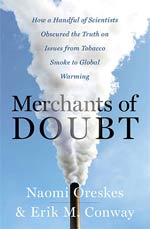Naomi Oreskes' Merchants of Doubt Australian tour
Posted on 15 November 2010 by John Cook
 A must-read book for anyone following climate science is Merchants of Doubt by Naomi Oreskes and Erik Conway. If you're at all familiar with the arguments of global warming skeptics, you'll have many a sense of deja vu as you read through the history of the attacks on science over the last 40 years. If you're in Australia, you also have the opportunity this week to hear Naomi Oreskes speak at a series of free public talks throughout the country, starting in Sydney tonight (then onto my hometown Brisbane tomorrow).
A must-read book for anyone following climate science is Merchants of Doubt by Naomi Oreskes and Erik Conway. If you're at all familiar with the arguments of global warming skeptics, you'll have many a sense of deja vu as you read through the history of the attacks on science over the last 40 years. If you're in Australia, you also have the opportunity this week to hear Naomi Oreskes speak at a series of free public talks throughout the country, starting in Sydney tonight (then onto my hometown Brisbane tomorrow).
Merchants of Doubt examines the organised attack on scientific evidence and on science itself over the last 40 years. In the 1950s, as scientific evidence began to accumulate that smoking caused cancer, a small group of scientists actively campaigned to cast doubt on the evidence. When scientists calculated that nuclear war would cause a devastating nuclear winter, the same group of scientists sought to cast doubt not only on the science but on the entire scientific establishment.
What is striking is the same scientists keep appearing, casting doubts on each scientific consensus. A name that regularly appears is Fred Singer who continues to publish articles on global warming to this day. In 1983, Singer argued that evidence of acid rain damage was lacking, that much acidification was natural and was in some cases actually beneficial. When the ozone layer was found to be shrinking, Singer argued that ozone depletion was a natural variation being exploited by scientists eager for more grant money. When second hand smoking was found to cause cancer in non-smokers, Singer blamed the messenger, attacking the EPA.
Also striking is that the arguments used against acid rain, DDT, CFCs and smoking are the same arguments encountered now in global warming skepticism. Over the last 40 years, they argued that there's no evidence. It's not us. It's beneficial. It's a conspiracy. There's no consensus. Ozone depletion was blamed on volcanoes. Human activity is too small. All the same arguments were being repeated over and over... by the same people.
So be sure to read Merchants of Doubt. If you're in Australia, don't miss Naomi Oreskes' free public talks this week. If you can't attend any of her talks, you can also hear her speak in the media:
- Interview on this morning's ABC Breakfast Radio
- Interview on ABC Lateline TV
- Profile by Adam Morton in Saturday's The Age
- Graham Readfern blogs about Australia's own Merchants of Doubt
- Australian Federal Minister for Science Industry and Innovation, Kim Carr, writes a stirring article, Science champions needed to battle merchants of doubt
- Commodity of Doubt - a blog post about a UWA panel on climate communication and Naomi Oreske's W.A. event
- Video of the Adelaide event
- Surprising article from the conservative newspaper The Australian, Some sceptics make it a habit to be wrong
- ABC Drum Unleashed, On the origin of the sceptics by Graham Readfern.
- ABC Rural Radio interview: Climate sceptics unwarranted
Details of Naomi Oreskes' Australian events
| Place | Time | Details |
| Sydney | Monday 15 Nov 6.00 to 8.00pm | Where: University of New South Wales, Law Theatre (Law Building) RSVP: No booking required. Presented by: Climate Change Research Centre and Faculty of Arts & Social Science (Prof. Oreskes will be introduced by Robyn Williams, Presenter of the ABC’s The Science Show) |
| Brisbane | Tuesday 16 Nov 5.30 to 6.30pm | University of Queensland, Abel Smith Lecture Theatre, St Lucia. VP: http://gci.uq.edu.au/naomi-oreskes Presented by: The Global Change Institute. (Prof. Oreskes will be introduced by Prof. Ove Hoegh-Guldberg, Director of the Global Change Institute. Merchants of Doubt will be available for purchase.) VIEW THIS TALK ON SLOW TV |
| Melbourne | Wednesday 17 November 5.45 to 7.00pm | Where: Experimedia, The State Library of Victoria, 328 Swanston St, Melbourne. RSVP: No booking required Presented by: The Monash Sustainability Institute & The Melbourne Sustainable Society Institute. (Prof. Oreskes will be introduced by Prof. Karoly, with Q&A moderated by Prof. Dave Griggs, MSI. Merchants of Doubt will be available for purchase before the lecture, with signing and sales afterwards.) |
| Adelaide | Thursday 18 November 6.00 to 7.30pm | Where: RIAus @ The Science Exchange, 55 Exchange Place, Adelaide. RSVP: http://www.riaus.org.au/events/2010/11/18/merchants_of_doubt.jsp Presented by: RIAus |
| Perth | Monday 22 November 6.00pm | Where: University of Western Australia, Social Sciences Lecture Theatre (parking P3, Hackett Entrance) RSVP: No booking required. Presented by: The Institute of Advanced Studies. (Merchants of Doubt will be available for purchase from 5.30pm with the author signing afterwards.) |































 Arguments
Arguments























 0
0  0
0






Comments